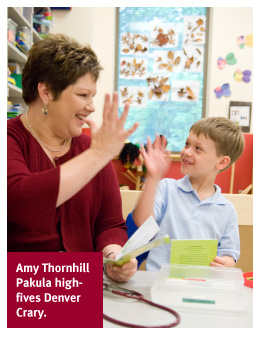 |
Amy Thornhill Pakula works in a world filled with children. On average, Pakula sees 10 to 12 patients daily at the Marcus Institute near Emory. But Pakula is not your typical pediatrician. She is one of a small number of physicians nationwide who specialize in pediatric neurodevelopment. Her patient wait list is a year.
In the midst of a demanding practice, Pakula is broadening her career path as a student in the RSPH Career Master of Public Health (CMPH) program. She chose the maternal and child health epidemiology track, developed by the Women’s and Children’s Center. Her classes have provided a new way of thinking about areas such as obstacles to care and disparities—both of which affect her patients and their families. provided a new way of thinking about areas such as obstacles to care and disparities—both of which affect her patients and their families.
“There are a tremendous number of problems in the field of neurodevelopmental disabilities with regard to racial and socioeconomic disparities,” she says. “Access to care is a huge issue at the moment for lots of reasons. I’m more aware of funding and public policy issues than I was before. I’ve learned a lot about the importance of public policy, which is critical to all kinds of services that impact people with disabilities.”
In the course of her practice, Pakula provides a variety of services for children and their families. “Most of my work is clinical,” she says. “I see several new patients and a number of follow-ups during the day. During a portion of my week, I do diagnostic evaluations, case coordination, medication management, and ongoing developmental monitoring. I also provide medical oversight for the feeding program here at Marcus. We have a pediatric eating disorders program that’s excellent.”
A member of the clinical faculty in Emory’s Department of Pediatrics, Pakula also collaborates with the Department of Human Genetics on an autism data-collection project. In her practice at the Marcus Institute, Pakula sees young patients with autism as well as cerebral palsy, cognitive impairments and learning disabilities, syndromes and other non-progressive neurologic disorders. She follows many of these children over time, working with their families to coordinate educational services, medical therapies, medication management, and behavioral interventions. She strives to help parents understand their children’s disabilities from a scientific perspective and to access available resources and services, both public and private. She also reviews cases for parents planning to adopt children from other countries.
Given her range of responsibilities, Pakula is not yet certain where her CMPH studies may lead. But she sees a wealth of opportunities ahead.
“Having my office down the street from the RSPH and the CDC is unbelievable,” she says. “I’m practically on the Emory campus. If I’m prepared, the opportunity is bound to present itself to be able to use my public health knowledge and training. A public health degree will help me expand my reach within my field, beyond seeing one patient at a time, day after day.” |
 |



